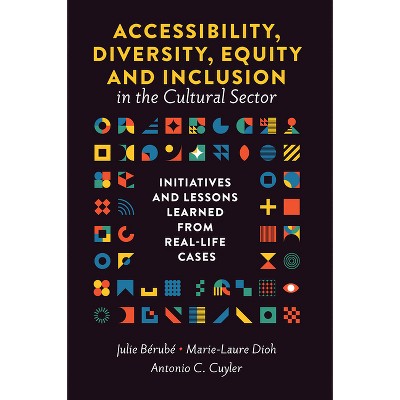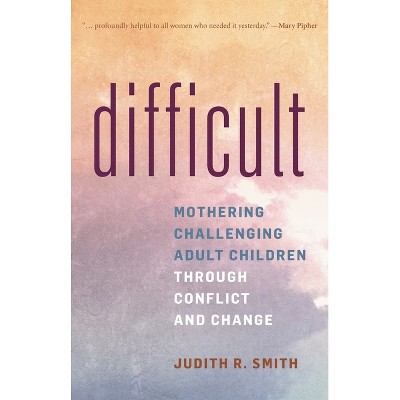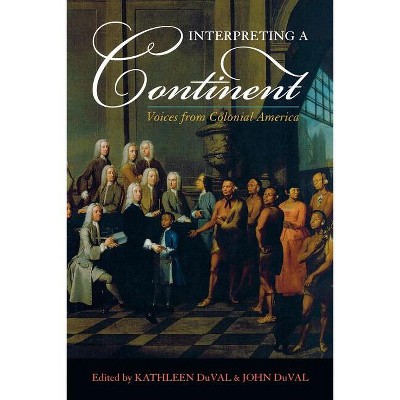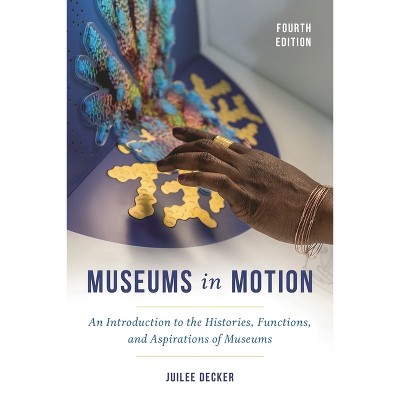Sponsored

Interpreting Difficult History at Museums and Historic Sites - (Interpreting History) by Julia Rose (Paperback)
$43.49Save $4.51 (9% off)
In Stock
Eligible for registries and wish lists
Sponsored
About this item
Highlights
- Interpreting Difficult History at Museums and Historic Sites is framed by educational psychoanalytic theory and positions museum workers, public historians, and museum visitors as learners.
- About the Author: Julia Rose is presently the director of the West Baton Rouge Museum.
- 232 Pages
- History, Study & Teaching
- Series Name: Interpreting History
Description
About the Book
Interpreting Difficult History at Museums and Historic Sites is framed by educational psychoanalytic theory and positions museum workers, public historians, and museum visitors as learners. Through this lens, museum workers and public historians can develop compelling and ethi...Book Synopsis
Interpreting Difficult History at Museums and Historic Sites is framed by educational psychoanalytic theory and positions museum workers, public historians, and museum visitors as learners. Through this lens, museum workers and public historians can develop compelling and ethical representations of historical individuals, communities, and populations who have suffered. To learn more, check out the website here: http: //interpretingdifficulthistory.com/Review Quotes
[A] a powerful and poignant study of the challenges that museum professionals and public historians face in bringing the past to life without succumbing to nostalgia, sentimentality or whitewashed, sanitized or commercialized conceptions of history.
(Reviewed jointly with Fostering Empathy Through Museums)
Both books contribute to the dialogue on museums as social agents, and both address the importance of personalizing exhibitions by telling stories. They deepen the growing dialogue on the role of emotions aroused by exhibitions. As institutions increasingly present controversial issues, they need strategies for approaching anger and resistance. Rose's Commemorative Museum Pedagogy summarizes steps that are already taken by many institutions, but in a way that puts them into relief for those who have not yet discovered those strategies.... Together, these books will be of use to museum educators, curators, and others as they strive to offer experiences in which members of the public engage with contested histories.... [B]ooks like Rose's and Gokcigdem's offer pathways toward a deeper consideration of the issues involved.
[I]t's hard at first to heed Julia Rose's advice in Interpreting Difficult History at Museums andHistoric Sites--that when visitors brazenly deny the brutal realities of the past, we should not insist that 'That is how the history happened' and 'These are the facts' since that 'will most likely not address learners' discomfort.' But Rose's masterful book dives deep into discomfort. She is taking seriously what is required to create an environment where history workers and visitors can all finally 'go there, ' and truly confront the most disturbing and emotional implications of American history. . . .[B]y exploring the roots of resistance, the book forces any of us who start thinking 'I can't do this, this is too hard' to examine where that's really coming from. And by bringing administrators, workers, and visitors together into a single category of learners, the book creates a sense of mutual enterprise, responsibility, and opportunity. I hope we'll all rise to the challenge.
In this original and insightful book, Julie Rose offers a penetrating analysis of the challenges confronting--and the rewards awaiting--public historians as they encourage audiences to take an honest, unblinking look at the past. It is a must read for anyone seeking to use effectively the transformational power of history to shape a better future.
Julie Rose makes a valuable contribution in Interpreting Difficult History. As sites across the country bring challenging stories to their interpretation, history workers will come upon unforeseen challenges. Interpreting Difficult History synthesizes and adapts psychology to unlock the learning processes of both visitors and front line staff . This work is critically important for museum professionals. Dr. Rose's Commemorative Museum Pedagogy is a straightforward strategy for dealing with the particular needs and issues of contentious and upsetting history. Any historic site with a social justice focus or simply a temporary exhibition dealing with difficult topics will be well-served to turn to this book as a roadmap and training resource.
Rose provides a remarkably thorough and thought-provoking theoretical basis for displaying 'difficult' histories in public venues. By including an impressive bibliography of works that examine everything from memory to the psychology of the viewer to how to create intimacy in uncomfortable exhibit spaces, the author has broken new ground in how practitioners of public history should think about exhibiting the 'history of oppression, violence, and trauma.' Divided into six chapters, the book provides a framework for defining and displaying difficult histories, along with a discussion of the ethics that surround such memorializations. Rose concludes by providing a case study as well as the five critical elements that she posits must be included in any delivery of a difficult history. She deftly illustrates that, when dealing with difficult histories, there are multiple, often conflicting points of view that must be considered in order to accurately represent what can be a painful past. In addition, difficult histories can help viewers and learners absorb and apply the lessons learned in that uneasy space to see how their actions can undo the injustices of the past in the present. Summing Up: Recommended. Upper-division undergraduates and above.
About the Author
Julia Rose is presently the director of the West Baton Rouge Museum. Her primary research interests focus on interpreting difficult histories and documenting historical enslaved plantation communities for museum interpretations. Currently, Rose also serves as the Chairman for the Council for the American Association for State and Local History, and is a board member for the Louisiana Association of Museums. She received her Ph.D. from Louisiana State University, a Master of Arts in Teaching from the George Washington University, and a Bachelor of Arts in Fine Art and Education from State University of New York at Albany. She has held curator positions at the Columbia Historical Society in Washington, D.C., Children's Museum of Oak Ridge, East Tennessee Historical Society, and Magnolia Mound Plantation, and was a faculty member in the Master of Arts in Museum Studies Program at Southern University at New Orleans. In addition, Rose is presently an adjunct faculty member at Louisiana State University where she teaches museum studies.Dimensions (Overall): 9.9 Inches (H) x 6.9 Inches (W) x .5 Inches (D)
Weight: 1.0 Pounds
Suggested Age: 22 Years and Up
Number of Pages: 232
Genre: History
Sub-Genre: Study & Teaching
Series Title: Interpreting History
Publisher: Rowman & Littlefield Publishers
Format: Paperback
Author: Julia Rose
Language: English
Street Date: May 2, 2016
TCIN: 1004176014
UPC: 9780759124370
Item Number (DPCI): 247-29-0360
Origin: Made in the USA or Imported
If the item details aren’t accurate or complete, we want to know about it.
Shipping details
Estimated ship dimensions: 0.5 inches length x 6.9 inches width x 9.9 inches height
Estimated ship weight: 1 pounds
We regret that this item cannot be shipped to PO Boxes.
This item cannot be shipped to the following locations: American Samoa (see also separate entry under AS), Guam (see also separate entry under GU), Northern Mariana Islands, Puerto Rico (see also separate entry under PR), United States Minor Outlying Islands, Virgin Islands, U.S., APO/FPO
Return details
This item can be returned to any Target store or Target.com.
This item must be returned within 90 days of the date it was purchased in store, shipped, delivered by a Shipt shopper, or made ready for pickup.
See the return policy for complete information.











